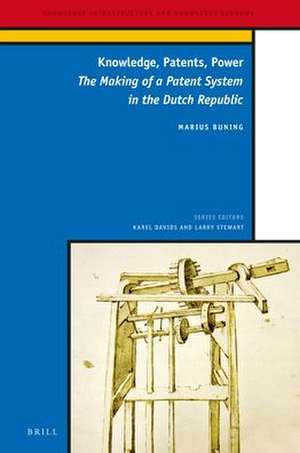Knowledge, Patents, Power: The Making of a Patent System in the Dutch Republic: Knowledge Infrastructure and Knowledge Economy, cartea 7
Autor Marius Buningen Limba Engleză Hardback – 8 dec 2021
Preț: 699.39 lei
Preț vechi: 852.93 lei
-18% Nou
Puncte Express: 1049
Preț estimativ în valută:
133.82€ • 139.73$ • 110.76£
133.82€ • 139.73$ • 110.76£
Carte indisponibilă temporar
Doresc să fiu notificat când acest titlu va fi disponibil:
Se trimite...
Preluare comenzi: 021 569.72.76
Specificații
ISBN-13: 9789004320390
ISBN-10: 9004320393
Dimensiuni: 155 x 235 mm
Greutate: 0 kg
Editura: Brill
Colecția Brill
Seria Knowledge Infrastructure and Knowledge Economy
ISBN-10: 9004320393
Dimensiuni: 155 x 235 mm
Greutate: 0 kg
Editura: Brill
Colecția Brill
Seria Knowledge Infrastructure and Knowledge Economy
Notă biografică
Marius Buning, Ph.D. (2013), is a Postdoctoral Fellow in the CREATIVE IPR project, University of Oslo. His research interests focus on the origins of intellectual property and the role of the state in shaping notions of scientific and technological progress.
Cuprins
Acknowledgements
List of Figures and Tables
Introduction
Preliminary
Scope and objectives
Outline
1 Inventing a System
The Dutch Revolt: Setting the stage
Patents in the Habsburg Netherlands
The political organization of the Dutch Republic
Patents amidst constitutional confusion
Conclusions
2 Administrative Practices
The application process
Examinations and rewards
Areas of usage: war, trade and industry
Conclusions
3. Legitimate Monopolies
Historical backgrounds
Privileges as a legal instrument
Experimental practices
Conclusions
4. Merchants of Ideas
The dawn of projects
Venture capital
The applicants
Costumers and clients
Conclusions
5 The Circulation of Knowledge
Inventions and discoveries
Novelties and imitation
Competition and friendly exchange
Notions of efficiency
Conclusions
6. Conclusions: A Dutch Republic of Patents
Patents and the production of knowledge
Republican patents
The aftereffects
Bibliography
Index
List of Figures and Tables
Introduction
Preliminary
Scope and objectives
Outline
1 Inventing a System
The Dutch Revolt: Setting the stage
Patents in the Habsburg Netherlands
The political organization of the Dutch Republic
Patents amidst constitutional confusion
Conclusions
2 Administrative Practices
The application process
Examinations and rewards
Areas of usage: war, trade and industry
Conclusions
3. Legitimate Monopolies
Historical backgrounds
Privileges as a legal instrument
Experimental practices
Conclusions
4. Merchants of Ideas
The dawn of projects
Venture capital
The applicants
Costumers and clients
Conclusions
5 The Circulation of Knowledge
Inventions and discoveries
Novelties and imitation
Competition and friendly exchange
Notions of efficiency
Conclusions
6. Conclusions: A Dutch Republic of Patents
Patents and the production of knowledge
Republican patents
The aftereffects
Bibliography
Index






